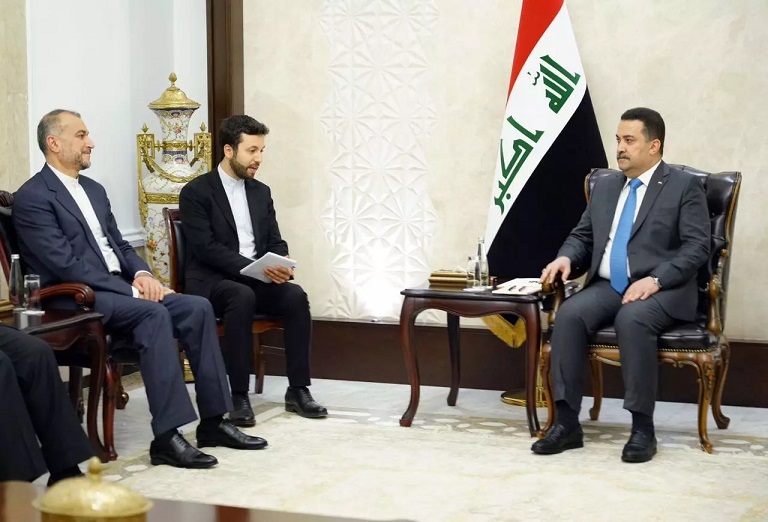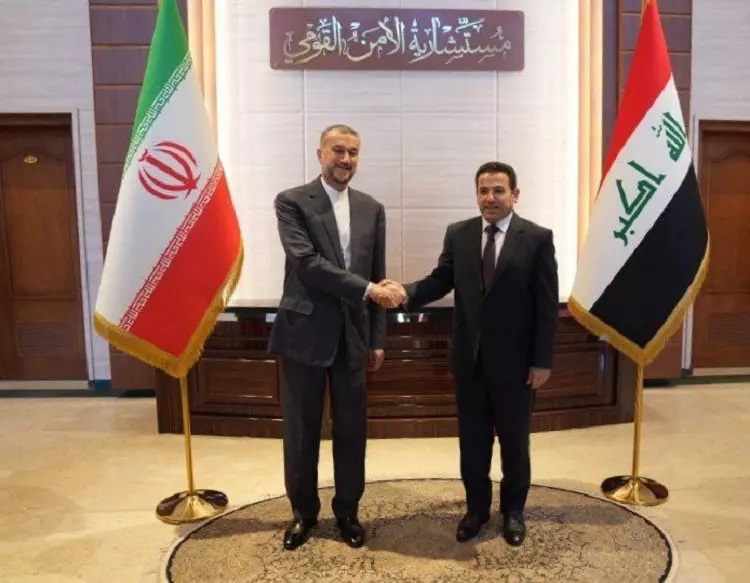Iran Press/ West Asia: During the visit to Baghdad, Amir-Abdollahian met with the Iraqi Prime Minister and National Security Advisor, discussing the issues of bilateral interest.

Amir-Abdollahian conveyed the greetings of the Iranian President and said: “We are in Baghdad to have consultations in this field with regard to the developments in Palestine and Gaza.”
The top Iranian diplomat added: “It is no secret that we are facing the war crimes of the Zionist regime in Gaza against the people and ordinary citizens of Palestine. In a situation where the Zionist regime has completely besieged Gaza, cut off its water, electricity, and fuel, and is preventing the delivery of food and medicine, the U.S. and certain countries are sending weapons to Israel and have allowed this criminal regime to kill Palestinian citizens and civilians in Gaza brutally.”
Amir-Abdollahian warned that in such a situation, any possibility can happen, and new events can be witnessed in the region.
The Iranian foreign minister said: “Officials of certain countries contact us and ask about the possibility of opening a new front in the region. We told them that our clear answer regarding future possibilities is that everything depends on the actions of the Zionist regime in Gaza.”
He added that the action of the resistance groups in the Al-Aqsa storm operation was a totally Palestinian and spontaneous move. And the Westerners themselves also emphasize that Netanyahu’s extreme behavior created these conditions.
Amir-Abdollahian noted that the Zionist regime’s crimes continue, and no one in the region asks us for permission to open new fronts.
The top Iranian diplomat noted: “We are in contact with the International Red Cross and the United Nations officials. Through them, we are trying to send food and medicine to the people of Gaza. We are also consulting and exchanging views with some countries in the region in this regard.”
Amir-Abdollahian expressed gratitude to Iraq for its strong positions in support of Palestine and the people of Gaza and said: “Both the supreme authority and the Iraqi government, people, and movements strongly support Palestine. That is indicative of Iraq’s correct and deep view of the Palestinian issue.”
He went on to say: “In my diplomatic contacts with the Secretary General of the United Nations and Joseph Borrell, I said that what happened was a reaction to the aggressive actions and extremism of the Netanyahu administration.”
The top Iranian diplomat added that Tehran has requested the Secretary General of the Organization of Islamic Cooperation to hold an emergency meeting between the OIC foreign ministers. He said that Iran would welcome and support any initiative of Islamic countries to back the Palestinian nation.
He emphasized that it is definitely necessary to stop the crimes of the Zionist regime in Gaza, adding that the role of Iraq is also crucial in trying to achieve this goal.
Amir-Abdollahian also pointed to the security agreement between Iran and Iraq and emphasized the necessity of its full implementation.

He further highlighted the necessity of joint efforts to develop relations between Tehran and Baghdad, especially in economic fields, which was mutually approved by the Prime Minister of Iraq.
Al-Sudani, for his part, expressed gratitude and welcomed the Iranian Minister of Foreign Affairs to Iraq. He said: The visit shows Iran’s renewed emphasis on the Palestinian issue. Iran’s position on Palestine has been fixed and never changed.
He added that the issue of Palestine is a cause related to belief and not a politicized one.
The Iraqi prime minister said: “Supporting Palestine shows the conscience of every Muslim and every free person worldwide.”
Al-Sudani said that Baghdad is not surprised by the Al-Aqsa storm operation because the rights of the Palestinian people cannot be ignored. It is wrong to think that the rights of the Palestinian people will be forgotten by normalizing relations with the Zionist regime.
The Iraqi Prime Minister emphasized: “Even if one seeks to speak from the perspective of the United Nations and the internationally agreed language, [it must not be forgotten that] dozens of resolutions have been passed in the UN regarding Palestine and against Israel. Israel has not adhered to any of them. The Palestinian people have been deprived of their most basic rights. Naturally, the Palestinian people start an intifada to restore their rights.”
Presenting a report on Iraq’s diplomatic efforts in relation to Palestine and in supporting the Gazans, he stressed that the Iraqi nation is a friend and helper of the Palestinian nation.
Al-Sudani added, "Iraq supports holding an emergency meeting of the Organization of Islamic Cooperation to examine the issues of Gaza at the ministerial level and even heads of state. And we are ready for any help to hold it."
He added: We definitely cannot be an observer of the situation in Gaza, and the views of the supreme authority of Iraq in this field are also clear. We and Iran will continue our efforts in this regard.
Iran’s Minister of Foreign Affairs also met and talked with Qasim al-Araji, the Iraqi National Security Advisor.
Expressing gratitude to the Iraqi brothers for the good reception, Amir-Abdollahian expressed his satisfaction with the meeting and added that Iran and Iraq have always consulted each other on important regional issues, stressing that such consultations will continue.
Emphasizing the important role of Iraq in the region, the top Iranian diplomat said: “Today, Iraq's role regarding Palestine is also in the attention of everyone. We are aware of your good positions in supporting Palestine.”
Amir-Abdollahian noted that the positions of the Islamic Republic vis-à-vis Palestine are clear, and added: “We have always supported the inalienable rights of the Palestinians, but what happened in the Al-Aqsa storm operation was a completely Palestinian action, which was a spontaneous move in response to the continuous and provocative crimes committed by the Zionists against the Palestinians and the repeated attack on the Al-Aqsa Mosque.”
He emphasized that the incidents taking place in Gaza by the Zionist regime constitute clear examples of war crimes and that the failure to stop them can affect the entire region.
The Iranian foreign minister added that the sending of weapons by the United States to Israel in a situation where the Zionist regime is massacring the people of Palestine and Gaza is taking place before the eyes of the world.
Amir-Abdollahian emphasized that if Israel does not stop its attacks on the civilians of Gaza, the region will face new conditions. He said: “They [Israeli] cannot put Gaza under a complete siege and bombard civilians and commit war crimes and expect no reaction to these crimes.”
The top Iranian diplomat added that Tehran is pursuing an emergency meeting of foreign ministers of the Islamic countries, and said: “We are ready to host this meeting in Tehran. We expect that Iraq will also try to convince Islamic countries to hold this meeting.”
Amir-Abdollahian also hailed the efforts of the Iraqi government and al-Araji to implement the Tehran-Baghdad security agreement and emphasized the necessity of its full implementation. He added that Iran is confident in Iraq’s efforts, adding that Baghdad is the guarantor of its implementation.
The Iraqi national security advisor, for his part, welcomed the top Iranian diplomat to Iraq and said: “Palestine is an important and fundamental issue from the viewpoints of Iraq and Iran, and that the positions of the Iraqi government and Ayatollah Sistani are the same in this regard.”
Al-Araji added that millions of people will take to the streets of Baghdad on Friday to express their support for Palestine.
The Iraqi national security advisor said that the events in Gaza constitute a crime against women and children, stressing that he deems them completely unacceptable.
He added: "Stopping the killings should be considered and the rights of the Palestinian people should be taken into account."
Al-Araji said that coordinating and integrating the positions of Iran, Iraq, and Islamic countries is a very important issue.
He congratulated the expansion of Iran's relations with many countries in the region and the world and considered it a sign of Tehran’s wisdom and tactfulness.
He described the implementation of the security agreement between Iran and Iraq and the expulsion of armed groups as a great success that had not been done in many years.
Al-Araji added that the government and all Iraqi movements adhere to this agreement and said: “We consider it to be in the interest of both countries.”
He added that the Iraqi government follows the implementation of the security agreement at the highest level, noting that Baghdad is serious about its full implementation.
211

